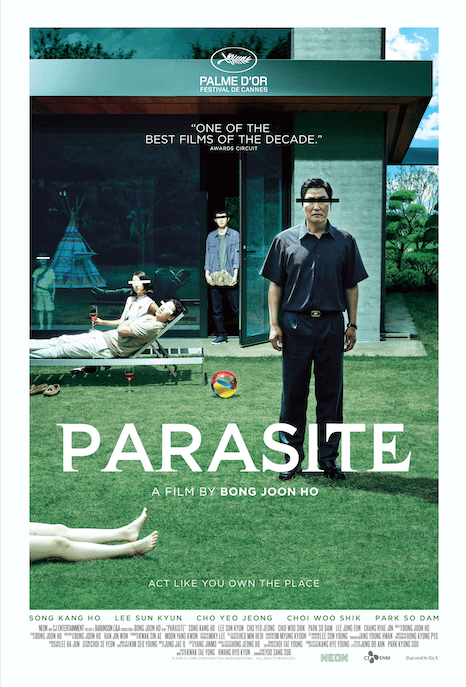by The Cowl Editor on February 13, 2020
Film and Television
by Julia Vaccarella ’20 A&E Staff

Since the release of Parasite last year, the acclaimed South Korean film has reached a widespread audience. Locally, the Avon Theater on Thayer Street has been offering patrons the opportunity to view the movie for several months. On a much larger scale, Parasite has also been nominated for several prestigious film awards, including the Golden Globes, the BAFTAs, and the Oscars. Parasite brought home the Oscars for Best Picture, Best Director, Best International Feature Film, and Best Original Screenplay.
The viewers who have been able to get past submitting themselves to subtitles, since the film is presented in Korean, will nonetheless be rewarded with the depth of the film’s plot. This element has actually had a positive contribution to the global interest that Parasite has garnered since its debut in May 2019. One reason for this is that many of the people who have opted to see the movie have claimed that they were still able to grasp the full meaning behind the film despite it not being in English.
“I think it just shows that Parasite isn’t a film that came out of nowhere. Korean cinema has a very long history, and Parasite is a continuation of all the Korean films that came before. It’s an extension of our history. It’s not the first time a Korean film has gone through something like this,” said director Bong Joon-ho in an interview with the New York Times. Such rhetoric is especially relevant considering increased criticism for the lack of diversity in the film industry.
The combination of humor and suspense present throughout has attracted individuals to Parasite. The film focuses on a family of four that is struggling to make ends meet. As a result, they all scheme to work for an affluent family by pretending to be unrelated and recommending one another for their respective positions. While socioeconomic differences would normally never bring families like the Kim’s and the Park’s together, Parasite displays just that, and the two families become closely connected.
However, what begins as a seemingly peaceful and harmless film about a poor family quickly shifts to a rather ominous and disturbing tone. The division between how the poor and the wealthy live and think drive this change; ultimately it is this theme that guides the entirety of the film.
The title of the film is meant to be purposely vague, as Joon-ho intended for his audience to interpret it for themselves. Will Gompertz of BBC News writes, “The movie’s title conveys the humiliation endured by the poor forced to live off the wealthy, for whom the word parasite is equally applicable. It is also questioning the political, economic and commercial philosophies upon which we build our lives. For the most part, the film does this with incisiveness and intelligence.”
With the juxtaposition of comedy and thrill, Parasite has made a profound impact in the film industry. From its complex plot to its powerful thematic elements, it is understandable why the film has been so successful.